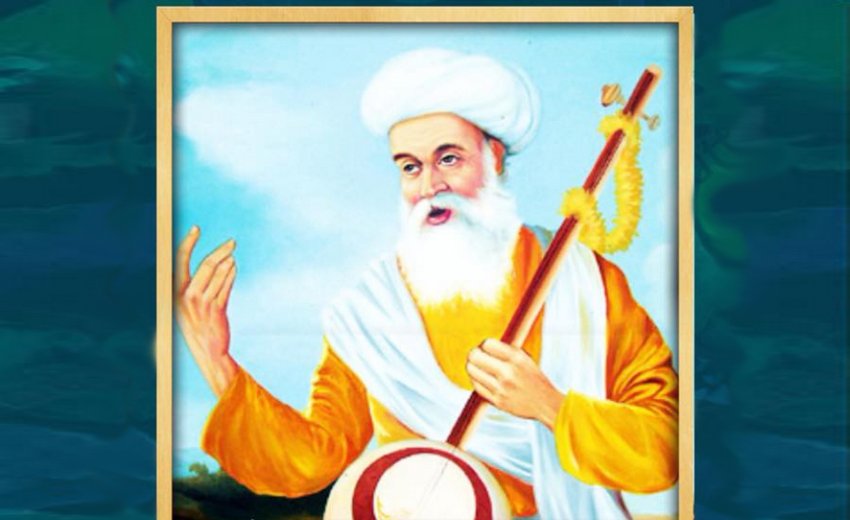English Poetic Translation by Professor Sukhchain Singh
~ Email : [email protected]
The earliest anthological record of Namdev's works occurs in the Guru Granth Sahib, the Sikh scriptures compiled in 1604, although Novetzke notes that while the manuscript records of Namdev mostly date from the 17th and 18th centuries, there exists a manuscript from 1581 that presents a rarely recounted variant version of Namdev's Tirthavli, a Marathi-language autobiographical piece. It is evident that the Guru Granth record is an accurate rendition of what Namdev wrote: the oral tradition probably accounts significantly for the changes and additions that appear to have been made by that time. The numerous subsequently produced manuscripts also show variant texts and additions that are attributed to him. Of around 2500 abhangs that were credited to him and written in the Marathi language, perhaps only 600 - 700 are authentic. The surviving manuscripts are geographically dispersed and of uncertain provenance.
Philosophy
Namdev was influenced by Vaishnavite philosophy.[6] His poems sometimes invoked Vithoba, sometimes Vishnu-Krishna as Govind-Hari, but in the larger context of Rama, which, states Ronald McGregor, was not referring to the hero described in the Hindu epic Ramayana, but to a pantheistic Ultimate Being. Namdev's view of Rama can be visualised, adds McGregor, "only as the one true, or real Teacher of man (satguru)".
Indian traditions attribute varying theosophical views to Namdev. In north India, Namdev is considered as a nirguna bhakta, in Marathi culture he is considered a saguna bhakta.
Namdev, also transliterated as Namdeo and Namadeva, (traditionally, c. 1270 – c. 1350) was a poet-saint from Maharashtra, India who is significant to the Varkari sect of Hinduism. He is also venerated in Sikhism, as well as Hindu warrior-ascetic traditions such as the Dadupanthis and the Niranjani Sampraday that emerged in north India during the Islamic rule.
Details of the life of Namdev are vague. Namdev was married to Rajai and had a son, Vitha, both of whom wrote about him, as did his mother, Gonai. According to Mahipati, a hagiographer of the 18th century, Namdev's parents were Damashet and Gonai, a childless elderly couple whose prayers for parenthood were answered and involved him being found floating down a river. As with various other details of his life, elements such as this may have been invented to sidestep issues that might have caused controversy.
The Adi Granth of Sikhism includes a compilation of 61 songs of Namdev (18 Raags : Gauri, Aasa, Gujri, Sorath, Dhanaasri, Todi, Tilang, Bilaawal, Guara, Ramkali, Maali-Guara, Maaru, Bhairav, Basant, Saarang, Malhaar, Kaanra, Prabhaati.). However, of these only 25 are found in surviving Namdev-related manuscripts of Rajasthan. Winand Callewaert suggests that Namdev's poems in the Adi Granth and the surviving Rajasthani manuscripts are considerably different musically and morphologically, but likely to have evolved from a very early common source......Source
In the company of Jnanadeva and other saints, he roamed about the country and later came to the Punjab where he is said to have lived for more than twenty years at Ghuman, in Gurdaspur district, where a temple in the form of samadh still preserves his memory. This temple was constructed by Sardar Jassa Singh Ramgarhia and the tank by its side was got repaired by Rani Sada Kaur , mother-in-law of Maharaja Ranjit Singh.
Guru Granth Sahib recognizes many saints of the Bhakti movement of medieval India. Namdev is among the saints belonging to this movement which swept across the North India from 1100 A.D. till 1600 A.D. When Fifth Guru Guru Arjan dev ji compiled Guru Granth Sahib, he decided to give some recognition to the saints of Bhakti movement, that is the reason that Guru Granth Sahib contains verses of such saints. In some cases Guru Granth Sahib is the only voice remained for such saints over the years. ......Source
